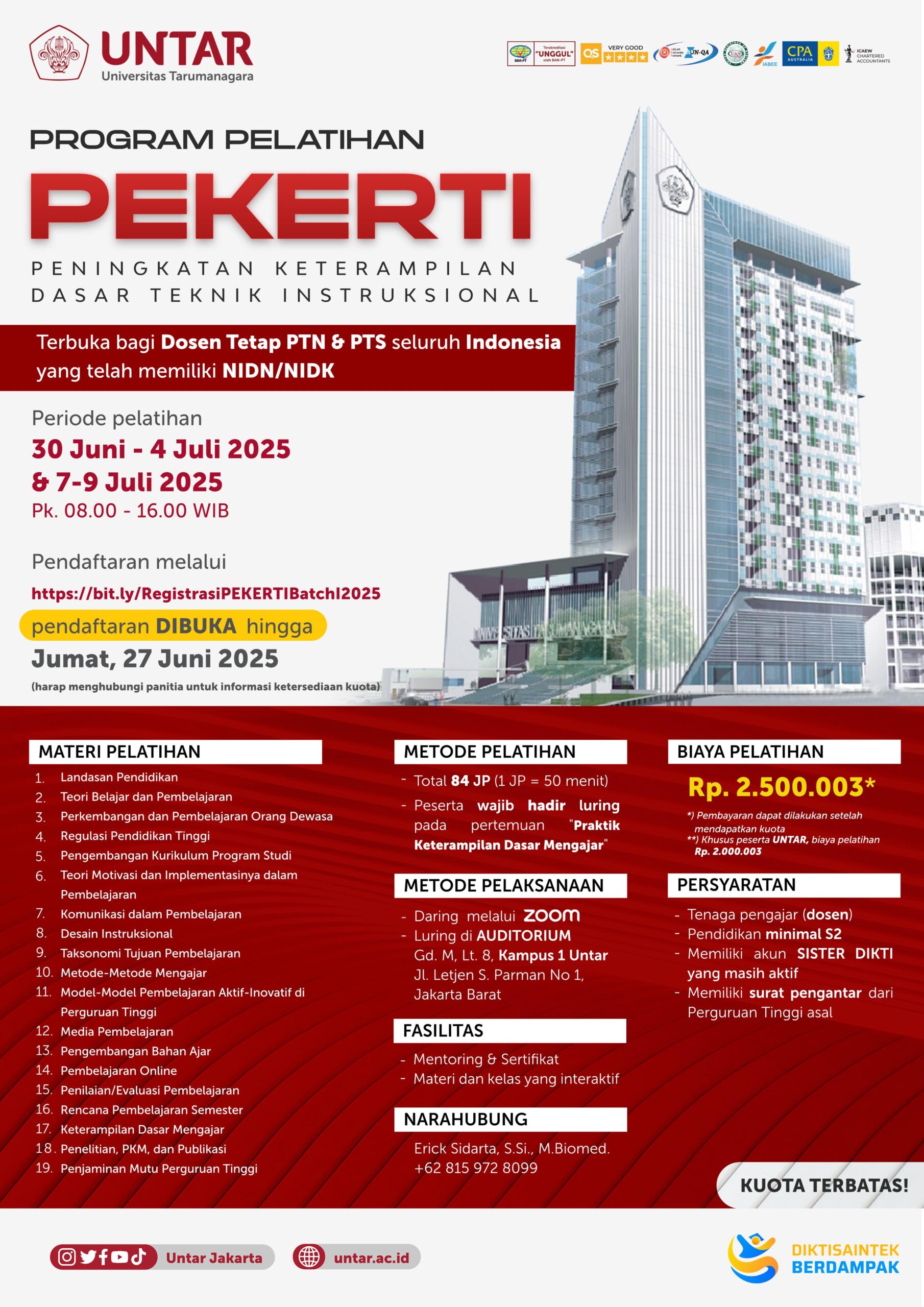One of the excellent researches by Untar Rector Prof. Dr. Ir. Agustinus Purna Irawan, M.T., M.M., I.P.U., ASEAN Eng. along with various other research works of lecturers and students, has contributed to maintaining Untar’s highest position as a university with Independent Cluster for research and community service (PKM) performance.
The Directorate of Research, Technology, and Community Service of the Ministry of Education, Culture, Research, and Technology (Kemendikbudristek) of the Republic of Indonesia issued the Decree of Director of Research, Technology, and Community Service Number 1350/E5/PG.02.00/2023 dated December 28, 2023 on the Determination of Clusterization of Higher Education on Saturday (30/12). This year 2024 is the sixth year Untar is included in the Mandiri cluster.
Agustinus revealed that Untar actively conducts research, PKM, and publications in order to support Untar’s performance and support the achievement of 17 Sustainable Development Goals (SDGs) to realize world development for global human welfare.
One of the researches developed and received a grant from Kemendikbudristek is the utilization of Indonesia’s local potential for making prosthesis made from natural fiber.
“The prosthetic leg that is the result of this research provides benefits because it uses Indonesia’s abundant local potential such as bamboo or rattan fibers that have not been optimally utilized, can be recycled, and is environmentally friendly. In addition, the product is low-cost so it is affordable for the community,” Agustinus said.
Agustinus said that the research product, a prosthetic leg, has been used by a physically challenged employee since 2010. The employee had lost his right leg in a traffic accident.
“Natural fiber prosthetic products are very strong and comfortable to use. Especially in carrying out daily activities for work by riding a motorcycle,” said Umar, one of the prosthesis users from Agustinus’ research.
Apart from prosthesis, Agustinus has also conducted a lot of research in the field of natural fiber composites for the development of various alternative products with a cross-country research team. According to him, this shows that collaboration is needed to produce great work.
The research involving universities from Indonesia and Malaysia, including Untar, Universiti Malaysia Pahang, INTI International University, Universitas Negeri Semarang (Unes), Universitas Diponegoro (Undip), Universitas Islam Indonesia, Institut Teknologi Bandung, Universiti Tun Hussein Onn Malaysia (UTHM), and Politeknik Negeri Lhokseumawe, has produced a number of publications in Q1 scopus indexed journals.
The Rector in his interview said that Untar strongly encourages academicians to produce research that supports SDGs.
“So that every work produced by higher education institutions has high benefits for the local community, even the world,” said the Rector.
In particular, the Rector expressed his appreciation to the entire academic community of Untar for the collaboration that has been established in maintaining the Mandiri cluster since 2019.
“This is inseparable from Untar’s policy that requires lecturers and students to carry out research, PKM, and publication activities in a sustainable manner,” explained the Rector.
According to the Rector, research and PKM are important to build reputation as well as Untar’s contribution in developing science and technology needed by the community.
“Untar will continue to facilitate all lecturers and students in accordance with the existing capabilities to produce reputable works in supporting the performance of research, PKM and publications, both internal to Untar, as well as collaboration between domestic and foreign universities,” said the Rector.
The clustering of universities in 2024 is based on SINTA-based university performance data during the period 2020 to 2022. The performance data taken into account has been verified and validated by the Research and Community Service Institution (LPPM) of the university. This includes data on authors, affiliations, articles, research, community service, intellectual property rights, and books.
Director of Research, Technology, and Community Service Prof. Dr. Ir. M. Faiz Syuaib, M.Agr. said that clustering is not a ranking, but a grouping of universities according to the qualifications of university performance.
The aim is to serve as a basis for preparing research roadmaps and strategic plans, as well as a basis for determining the authority to manage research and PKM in higher education. Clustering universities is a method of identifying, measuring performance, and grouping universities.
“It is expected to accelerate the performance of universities through collaboration schemes that unite and synergize the potential of universities through collaboration between universities across clusters in improving the quality of research and community service,” said Faiz.
Based on the data from the Ministry of Education and Culture, there are 943 universities that provide academic education throughout Indonesia that are included in the clusterization with four levels, namely Mandiri, Utama, Madya, and Pratama. Untar is one of 12 private universities and 47 universities in the Mandiri cluster. (AW/PA/KJ)
Read More on External Media



